Related Research Articles
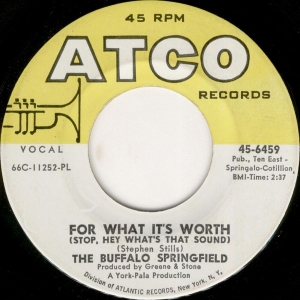
"For What It's Worth " is a song written by Stephen Stills. Performed by Buffalo Springfield, it was recorded on December 5, 1966, released as a single on Atco Records in December 1966 and peaked at No. 7 on the Billboard Hot 100 chart in the spring of 1967. Its association with the Vietnam War is a popular misconception; the song is about young people clashing with police during the counterculture era.

"Little Woman" is a 1969 song recorded by Bobby Sherman and composed by Danny Janssen.

"I Put a Spell on You" is a 1956 song recorded by "Screamin' Jay" Hawkins and officially co-written with Herb Slotkin. The selection became a classic cult song, covered by a variety of artists. It was Hawkins' greatest commercial success, reportedly surpassing a million copies in sales, even though it failed to make the Billboard pop or R&B charts.
Jay & the Techniques was an American pop group formed in Allentown, Pennsylvania during the mid-1960s. Their song "Apples, Peaches, Pumpkin Pie", released in 1967 on the Smash label, reached the Top 10 on the Billboard Hot 100 chart.

"What Would You Say" is a song by American rock group Dave Matthews Band. It was released in September 1994 as the lead single from their debut album Under the Table and Dreaming. It reached #11 on the Modern Rock Tracks chart. In June 1995 it peaked at #9 on the Mainstream Top 40 chart. John Popper of Blues Traveler appears as a guest performer, playing the harmonica.

"Bo Diddley" is a song by American rock and roll pioneer Bo Diddley. It introduced the rhythm that became known as the Bo Diddley beat and topped the Billboard R&B chart for two weeks in 1955. The song is included on many of Diddley's compilation albums including Bo Diddley (1958) and His Best (1997). Buddy Holly recorded a version that posthumously became his 2nd highest-charting single in the UK after "It Doesn't Matter Anymore".
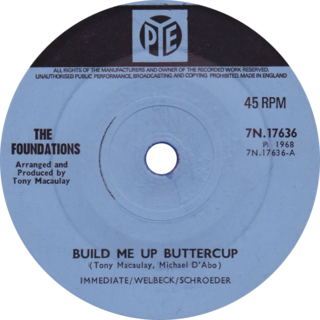
"Build Me Up Buttercup" is a song written by Mike d'Abo and Tony Macaulay, and released by The Foundations in 1968 with Colin Young singing lead vocals. Young had replaced Clem Curtis during 1968, and this was the first Foundations hit on which he sang.

"Mony Mony" is a 1968 single by American pop rock band Tommy James and the Shondells, which reached No. 1 on the UK Singles Chart and No. 3 in the U.S. Written by Bobby Bloom, Ritchie Cordell, Bo Gentry, and Tommy James, the song has appeared in various film and television works such as the Oliver Stone drama Heaven & Earth. It was also covered by English singer-songwriter Billy Idol in 1981. Idol's version, which took in more of a rock sound, became an international top 40 hit and additionally revived public interest in the original garage rock single. Idol recorded a live version in 1985 which was ultimately released in 1987 where it became an even bigger hit than the Shondells' 1968 original, reaching No. 1 on the Billboard Hot 100.

"Everything Zen" is a single by British rock band Bush. Released on 28 January 1995, it was the band's first single released under the name "Bush", and their second overall. The single comes from their 1994 debut album, Sixteen Stone.
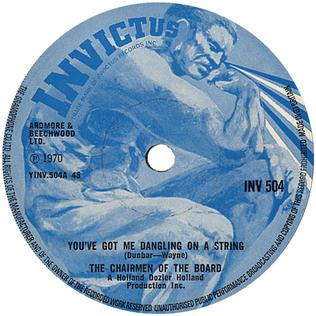
"(You've Got Me) Dangling on a String" is a 1970 soul music song by the Chairmen of the Board. The single reached No. 38 on the US Billboard Hot 100, No. 19 on the US Billboard R&B chart, and No. 5 on the UK Singles Chart. Ronald Dunbar and Edythe Wayne wrote the song.

"The Rain, the Park & Other Things" is a pop song with music and lyrics co-written by Artie Kornfeld and Steve Duboff. It was recorded by the pop band the Cowsills, and included on their 1967 self-titled debut album. Released as a single, the song reached No. 2 on the Billboard charts. It was kept from the No. 1 spot by "Daydream Believer" by the Monkees. The single cemented the group's international popularity and sold some three million copies over the years. It ties with 1969's "Hair" as the group's biggest hit, as both reached No. 2 in the US. In Canada, "The Rain, the Park & Other Things" reached No. 1 on the RPM singles chart.

"Because" is a song recorded by English rock band The Dave Clark Five from their third studio album American Tour (1964). The song was produced by Adrian Clark, and was originally the B-side to "Can't You See That She's Mine" in the UK.

Cotton Candy is an album by Al Hirt that was released in 1964 by RCA Victor. The album features the Anita Kerr Singers.
"Lay a Little Lovin' on Me" is a 1970 song written by Jeff Barry, Robin McNamara, and Jim Cretecos and recorded by Robin McNamara. The song reached number 11 on the Billboard Hot 100, and was McNamara's only hit. "Lay A Little Lovin' On Me" also peaked at number 6 on Canada's national RPM Top 100 singles chart in August 1970, and at number 49 in Australia in 1970. It wasn't his only charting single in Canada - the follow-up single, "Got To Believe In Love", reached number 62.

"Precious and Few" is a song recorded by American group Climax which became a major North American hit in early 1972. The song was written by the band's guitarist, Walter D. Nims.
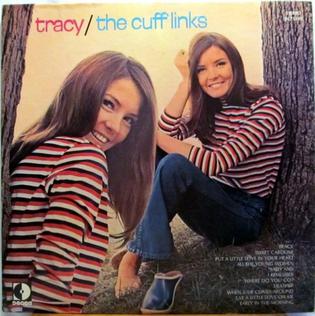
"Tracy" is a song written by Lee Pockriss and Paul Vance, the title track of the Cuff Links debut LP.
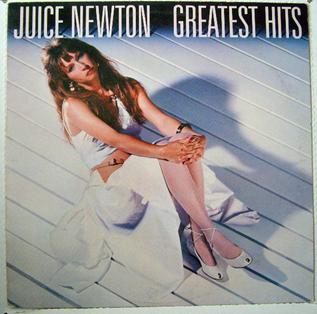
Greatest Hits is the ninth album and first greatest hits collection by country pop singer Juice Newton. It was originally released by Capitol Records in 1984 with ten tracks taken from her albums Juice, Quiet Lies, and Dirty Looks. It was reissued in 1986 in an expanded 15-track edition titled Juice Newton's Greatest Hits . The album became a best seller and has been certified gold by the Recording Industry Association of America.
"Let Love Come Between Us" is a song written by Joe Sobotka and Johnny Wyker and performed by James & Bobby Purify. The song was featured on their 1968 album, The Pure Sound of The Purifys - James & Bobby. The song was produced by Papa Don Enterprises.

"Western Union" is a 1967 song by the American rock band the Five Americans. The single peaked at number 5 on the Billboard Hot 100 in April 1967. It also reached number 7 on the Cash Box Top 100 Singles chart that same month.
Little Walter (1930–1968) was an American blues artist who is generally regarded as the most influential blues harmonica player of his era. Most of his earliest recordings were as a sideman, when he contributed harmonica to songs by Chicago blues musicians such as Jimmy Rogers and Muddy Waters. As the featured artist, he recorded the instrumental "Juke" in 1952. The single reached number one on the Billboard Rhythm and Blues chart and launched his career as a solo artist.
References
- ↑ Unterberger, Richie (January 1, 1997). "Various Artists - Soulful Pop (1996)". In Bogdanov, Vladimir; Erlewine, Michael; Erlewine, Stephen Thomas; Unterberger, Richie; Woodstra, Chris (eds.). AllMusic Guide to Rock. San Francisco: Miller Freeman, Inc. p. 1091.
- ↑ Jay & The Techniques, "Keep The Ball Rollin'" Retrieved April 4, 2013
- ↑ Al Hirt's "Keep The Ball Rollin'" Chart Positions Retrieved April 4, 2013